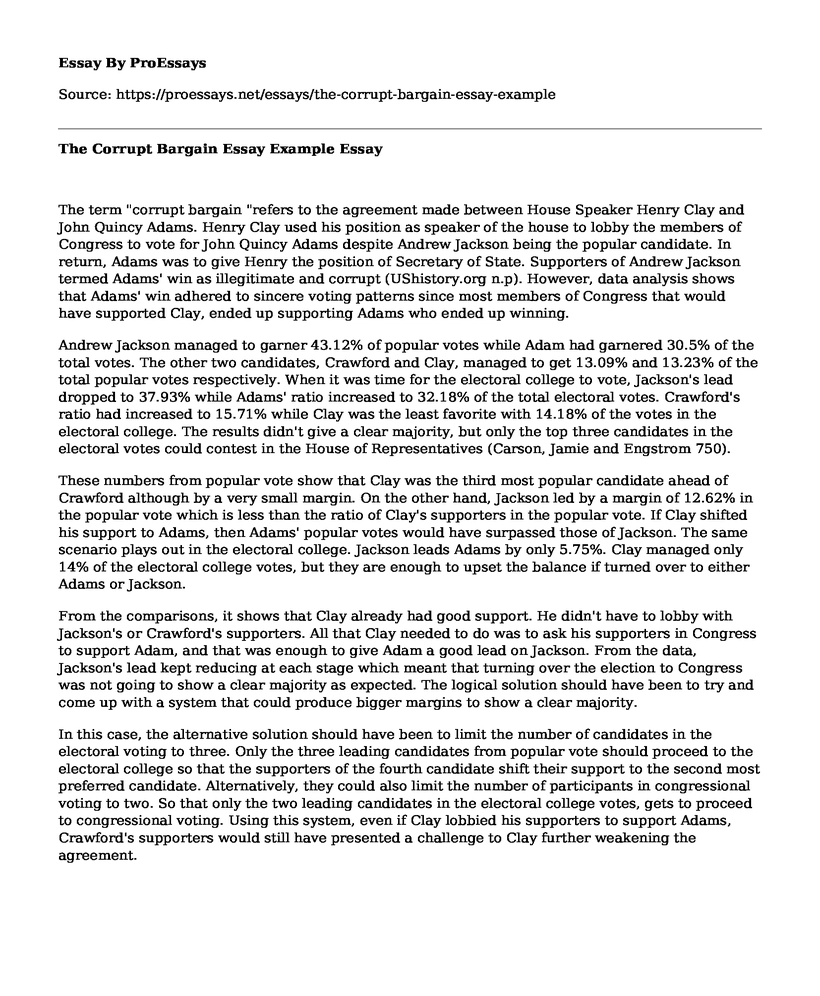The term "corrupt bargain "refers to the agreement made between House Speaker Henry Clay and John Quincy Adams. Henry Clay used his position as speaker of the house to lobby the members of Congress to vote for John Quincy Adams despite Andrew Jackson being the popular candidate. In return, Adams was to give Henry the position of Secretary of State. Supporters of Andrew Jackson termed Adams' win as illegitimate and corrupt (UShistory.org n.p). However, data analysis shows that Adams' win adhered to sincere voting patterns since most members of Congress that would have supported Clay, ended up supporting Adams who ended up winning.
Andrew Jackson managed to garner 43.12% of popular votes while Adam had garnered 30.5% of the total votes. The other two candidates, Crawford and Clay, managed to get 13.09% and 13.23% of the total popular votes respectively. When it was time for the electoral college to vote, Jackson's lead dropped to 37.93% while Adams' ratio increased to 32.18% of the total electoral votes. Crawford's ratio had increased to 15.71% while Clay was the least favorite with 14.18% of the votes in the electoral college. The results didn't give a clear majority, but only the top three candidates in the electoral votes could contest in the House of Representatives (Carson, Jamie and Engstrom 750).
These numbers from popular vote show that Clay was the third most popular candidate ahead of Crawford although by a very small margin. On the other hand, Jackson led by a margin of 12.62% in the popular vote which is less than the ratio of Clay's supporters in the popular vote. If Clay shifted his support to Adams, then Adams' popular votes would have surpassed those of Jackson. The same scenario plays out in the electoral college. Jackson leads Adams by only 5.75%. Clay managed only 14% of the electoral college votes, but they are enough to upset the balance if turned over to either Adams or Jackson.
From the comparisons, it shows that Clay already had good support. He didn't have to lobby with Jackson's or Crawford's supporters. All that Clay needed to do was to ask his supporters in Congress to support Adam, and that was enough to give Adam a good lead on Jackson. From the data, Jackson's lead kept reducing at each stage which meant that turning over the election to Congress was not going to show a clear majority as expected. The logical solution should have been to try and come up with a system that could produce bigger margins to show a clear majority.
In this case, the alternative solution should have been to limit the number of candidates in the electoral voting to three. Only the three leading candidates from popular vote should proceed to the electoral college so that the supporters of the fourth candidate shift their support to the second most preferred candidate. Alternatively, they could also limit the number of participants in congressional voting to two. So that only the two leading candidates in the electoral college votes, gets to proceed to congressional voting. Using this system, even if Clay lobbied his supporters to support Adams, Crawford's supporters would still have presented a challenge to Clay further weakening the agreement.
Works Cited
Carson, Jamie L., and Erik J. Engstrom. "Assessing the electoral connection: Evidence from the early United States." American Journal of Political Science 49.4 (2005): 746-757.
UShistory.org. The 1824 Election and the "Corrupt Bargain." 2018. Internet. 5 October 2018. <http://www.ushistory.org/us/23d.asp>.
Cite this page
The Corrupt Bargain Essay Example. (2022, Sep 06). Retrieved from https://proessays.net/essays/the-corrupt-bargain-essay-example
If you are the original author of this essay and no longer wish to have it published on the ProEssays website, please click below to request its removal:
- A Discussion on the Tort Law
- Multiculturalism in Europe Essay Example
- Essay Sample on Hate Crime on Campus
- Essay Sample on Providing Free Education for Prisoners
- Research Proposal on UAW Corruption Scandal
- Essay Example on Criminal Justice System: Media's Role in Informing Society
- Donald Trump Tries to Erase Tweets Blasting Journalists on Coronavirus Response - Essay Sample







